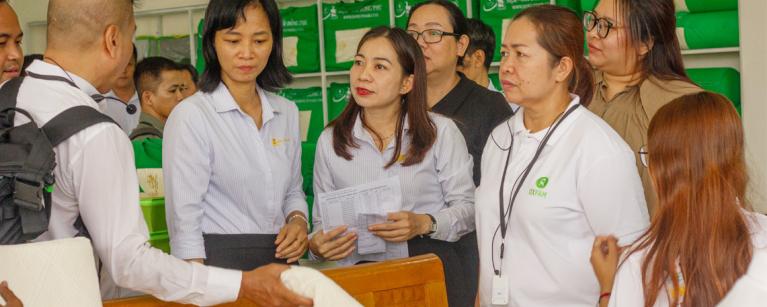Oxfam, in collaboration with Forest Trends and the Vietnam Rubber Association, organized a strategic learning exchange in mid-June focused on the European Union Deforestation Regulation (EUDR) compliance and sustainable rubber production in Binh Phuoc and Binh Duong provinces, Vietnam.
Over three days, a delegation of 20 representatives from Cambodia—including officials from the General Directorate of Rubber under the Ministry of Agriculture, Forestry, and Fisheries, private sector companies, local communities, and civil society organizations— engaged in a series of site visits and discussions aimed at strengthening understanding of the EUDR and promoting sustainable rubber production practices.
EUDR is a landmark policy aimed at ensuring that products consumed in the EU do not contribute to global deforestation or forest degradation, promoting sustainability and reducing environmental impact.
This exchange formed part of Oxfam’s broader efforts to support an equitable and environmentally responsible transition in agricultural supply chains. The program addressed growing international demand for deforestation-free products and demonstrated how stakeholders in Vietnam are adapting production systems to align with the new EUDR requirements.
Delegates visited Dong Phu Rubber Joint Stock Company (Doruco), a member of the Vietnam Rubber Group-a state-owned industry, to observe how corporations are segmenting and managing production lines to distinguish between EURD-compliant and non-compliant outputs. Insights from this visit helped Cambodian stakeholders visualize the operational and logistical shifts required to meet EU standard, including traceability, geolocation mapping and differentiated processing. During the discussion, delegates were briefed by an official from the Ministry of Agriculture and Environment on how Vietnam government facilitate EUDR compliance through targeted supports and regulatory interventions.
A subsequent tour of Dong Phu Rubber Technical Joint Stock Company highlighted final consumer products derived from natural rubber latex, such as latex pillows and mattresses. This segment emphasized the economic potential of value-added manufacturing and its role in boosting the market profile of sustainably produced rubber.
A key learning opportunity for small holders emerged during the visit to Mai Vinh Rubber Processing Factory, where participants engaged with small-scale rubber farmers and local processing staff, gaining insight into collaborative models that promote inclusion in EUDR compliance. Farmers shared experiences adapting agricultural practices, improving traceability and working with larger enterprises to access EU markets. This demonstrated viable pathways for Cambodia’s rubber smallholders to be integrated into formal value chains without facing exclusion from high-value export opportunities.
To conclude the exchange, Cambodian delegates participated in a structured reflection session where they identified actionable steps to strengthen domestic readiness for EUDR. Recommendations focused on strengthening collaboration among stakeholders particularly between companies and small-scale producer groups, mobilizing and organizing smallholder network, enhancing support for small-scale producers, establishing robust data and traceability systems, and promoting public-private partnership to foster a sustainable and responsible rubber sector.
This learning exchange reflects Oxfam’s strategic commitment to promoting inclusive, sustainable practices in agricultural production and trade in the region. Through cross-country dialogue, practical exposure, and stakeholder engagement, Oxfam is facilitating vital knowledge-sharing that strengthen environmental compliance, market readiness, and stakeholder engagement in Cambodia’s rubber industry.
